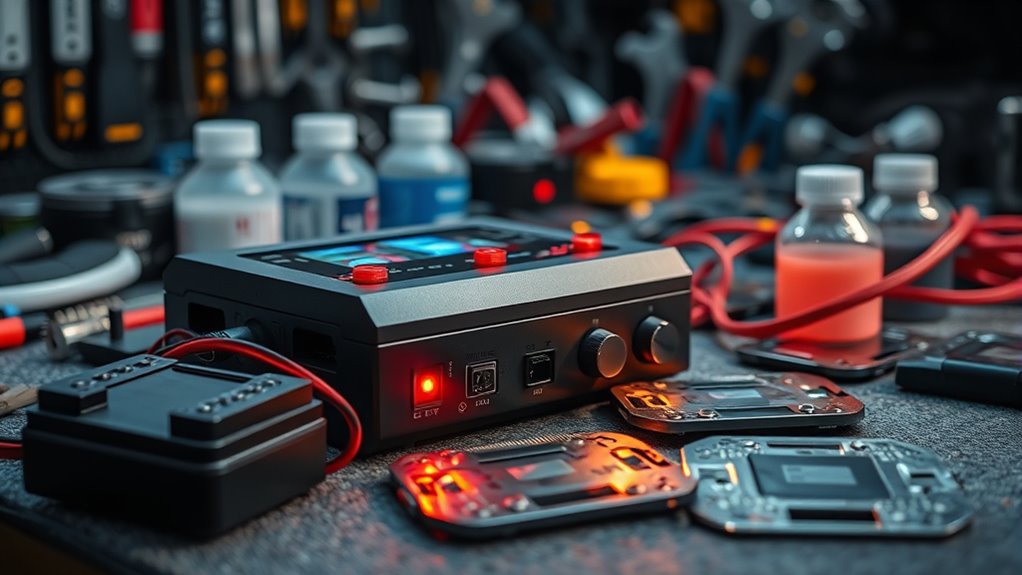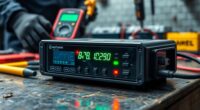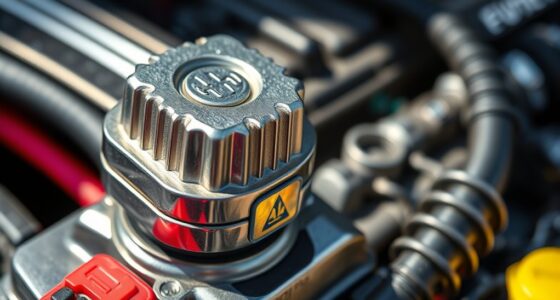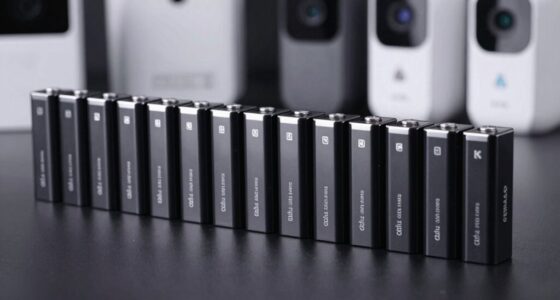If you’re looking to revive your 12V lead-acid batteries, I recommend exploring some of the top desulfators available. These devices use advanced pulse technology to dissolve sulfate buildup and extend battery life. They’re compatible with most lead-acid types and help maintain peak performance over time. Selecting the right model depends on your battery size, chemistry, and budget. Keep going, and you’ll find more details to help you choose the best desulfator for your needs.
Key Takeaways
- The best 12V battery desulfators use high-frequency pulse technology to dissolve lead sulfate crystals and restore battery capacity.
- Compatibility with various lead-acid batteries (AGM, GEL, flooded) and automatic detection features ensure safe, effective desulfation.
- Properly rated desulfators prevent damage and are suitable for batteries up to 200AH, ideal for cars, boats, and trucks.
- Safety protections like reverse polarity, overcurrent, and overvoltage safeguard batteries during operation.
- Regular use of desulfators extends battery lifespan, improves performance, and prevents sulfation buildup over time.
TowerTop Smart Car Battery Charger (10A, 6V/12V)
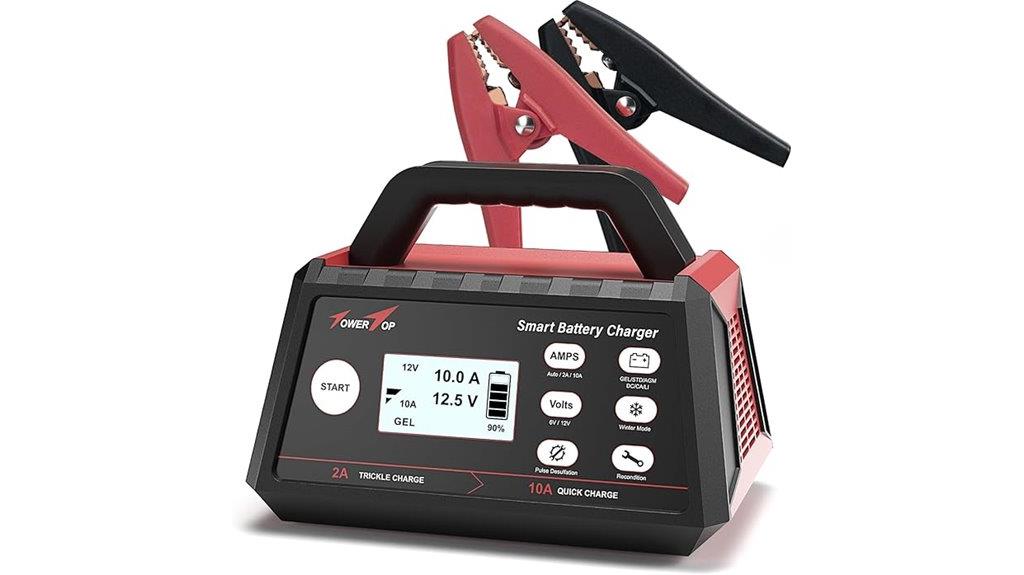
If you’re looking for a versatile charger that can handle a variety of battery types, the TowerTop Smart Car Battery Charger (10A, 6V/12V) is an excellent choice. It supports sealed lead-acid batteries like AGM, GEL, Wet, and deep-cycle, as well as lithium, calcium, and other types. With three adjustable current settings, it quickly charges a 25Ah battery in under two hours with about 85% efficiency. Its true 8-stage intelligent charging not only speeds up the process but also prolongs battery life by including repair and desulfurization functions. Fully automatic and equipped with safety protections, it’s reliable for automotive, marine, and recreational batteries.
Best For: vehicle, boat, and recreational battery owners seeking a versatile, efficient, and safe charger for various lead-acid and lithium batteries.
Pros:
- Supports a wide range of battery types including AGM, GEL, lithium, and deep-cycle for versatile use.
- Features true 8-stage intelligent charging with repair functions to extend battery lifespan.
- Fully automatic operation with safety protections and an HD LCD display for easy monitoring.
Cons:
- Smaller size and lightweight design may limit power for heavy-duty applications.
- Repair mode can potentially damage batteries if misused or used improperly.
- Not suitable for extreme cold environments or heavy-duty professional use; operates within 0-40°C.
NEXPEAK NC201 10-Amp Battery Charger
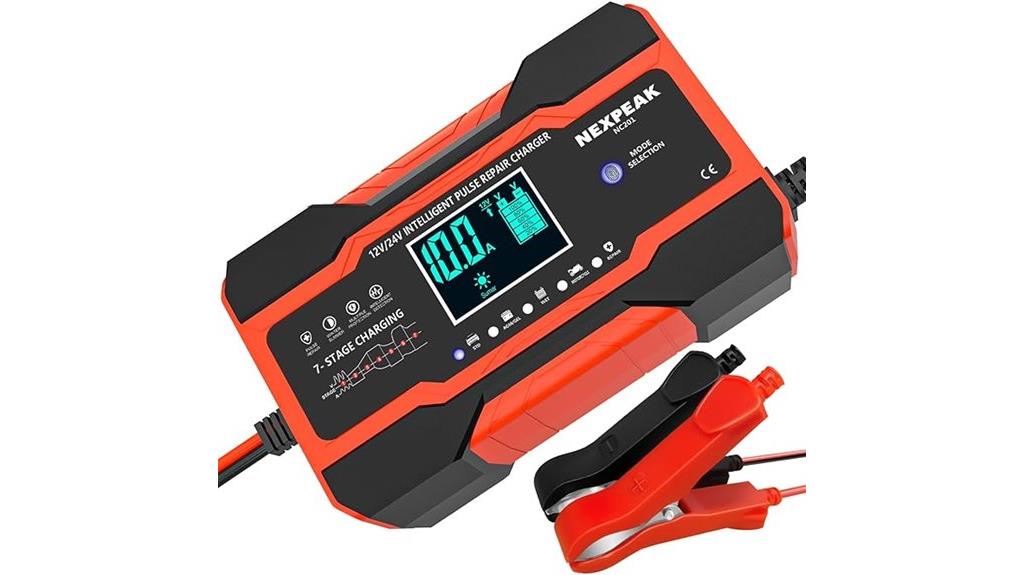
The NEXPEAK NC201 10-Amp Battery Charger stands out as an ideal choice for those seeking a versatile and reliable solution for maintaining and repairing 12V and 24V lead-acid batteries. It supports various types, including AGM, GEL, SLA, and Flooded, making it suitable for automotive, marine, and deep-cycle applications. With a fully automatic 7-stage charging process, it ensures safe, efficient charging and includes safety features like reverse polarity protection and overcharge prevention. Its high-efficiency pulse repair helps restore sulfated batteries, while the large LCD display makes monitoring easy. Overall, it’s a user-friendly, multi-function device designed to extend your battery’s lifespan.
Best For: DIY enthusiasts, vehicle owners, and marine operators seeking a versatile, safe, and effective battery maintenance and repair solution for various lead-acid batteries.
Pros:
- Supports multiple battery types including AGM, GEL, SLA, and Flooded for broad compatibility.
- Features a fully automatic 7-stage charging process with safety protections like reverse polarity and overcharge prevention.
- Equipped with high-efficiency pulse repair to restore sulfated batteries and extend battery lifespan.
Cons:
- Cannot activate or fully charge batteries that are completely dead (0V).
- Might be complex for users unfamiliar with battery maintenance or advanced settings.
- Larger LCD display may be more difficult to view in bright outdoor conditions.
TowerTop 12V Smart Car Battery Charger
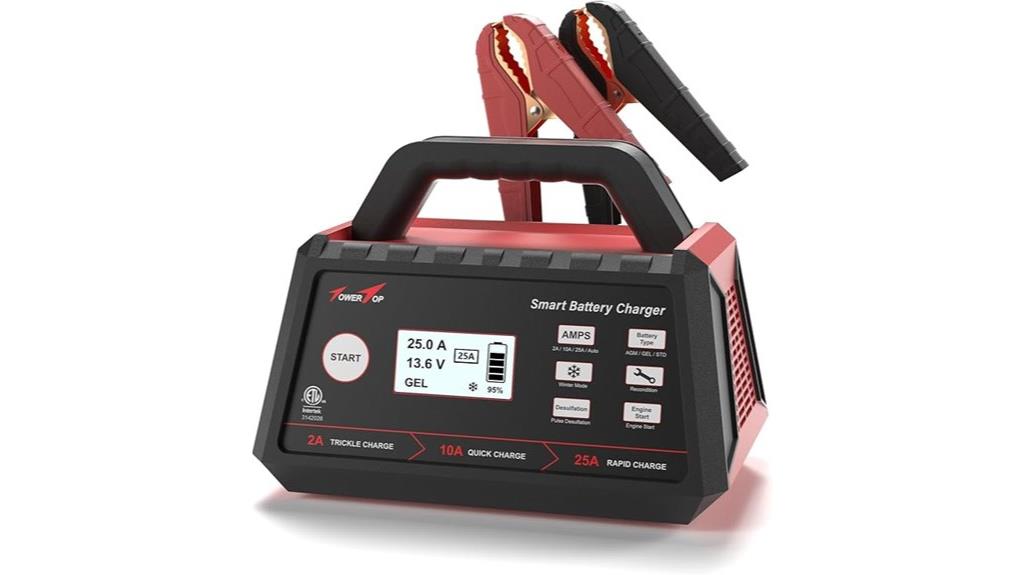
The TowerTop 12V Smart Car Battery Charger stands out for its fully automatic, intelligent charging system that detects your battery’s condition and begins charging within just 30 seconds. It offers four adjustable current settings, up to 25A, capable of fully charging a 100Ah battery in under 3.5 hours. Thanks to its 8-stage smart charging process, it optimizes battery health, prevents overcharging, and extends lifespan. Safety features like reverse polarity and short circuit protection ensure peace of mind. Its HD LCD keeps you informed, while its versatile compatibility supports various battery types, making it a reliable, user-friendly choice for reviving and maintaining your batteries.
Best For: vehicle owners and maintenance professionals seeking a reliable, automatic charger capable of restoring and maintaining various 12V lead-acid batteries with speed and safety.
Pros:
- Fully automatic operation with rapid battery detection and charging initiation within 30 seconds
- 8-stage smart charging enhances battery lifespan and prevents overcharging
- Versatile compatibility with multiple 12V battery types, including AGM, GEL, and lead-acid
Cons:
- Minor issues such as plastic clamp covers detaching easily or fan noise during operation
- Cannot repair batteries completely drained below 3V
- Some users experienced durability issues from water exposure, though support is responsive
Outerman Car Battery Charger, 12V-12A/24V-8.5AH Smart Automatic Battery Charger
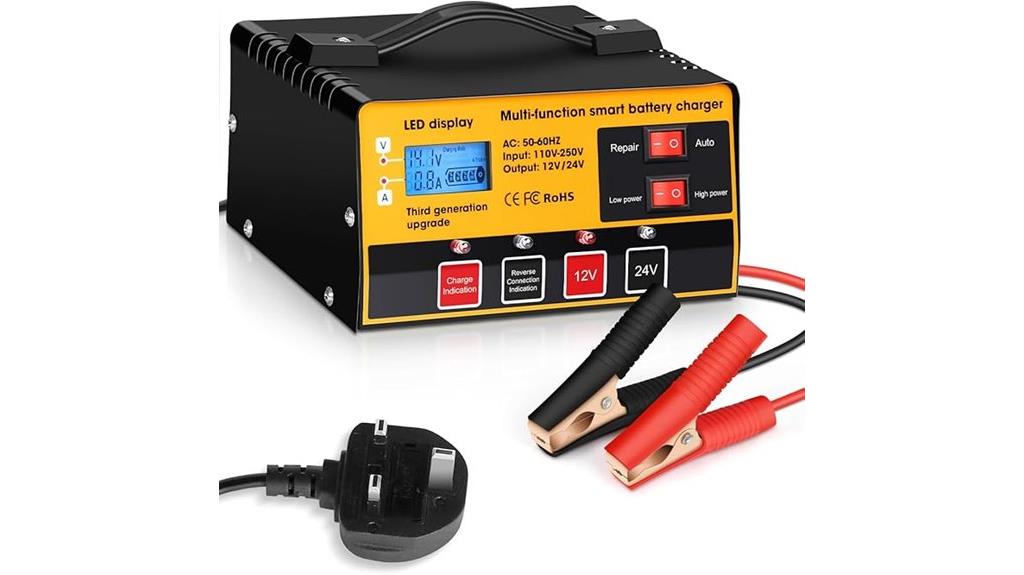
Designed for versatility, the Outerman Car Battery Charger supports both 12V and 24V batteries, making it ideal for automotive, marine, and other lead-acid-based applications. It can handle batteries up to 8.5AH and features a smart LCD display that automatically shows voltage and current, eliminating the need for manual adjustments. The charger offers multiple modes, including auto, manual, and repair, with a 5-stage pulse repair to restore internal resistance. Compact and lightweight, it connects easily via clamps, providing fast, reliable charging. While some users report inconsistent output, its ability to diagnose, maintain, and repair a variety of batteries makes it a versatile tool for vehicle and marine owners.
Best For: vehicle, marine, and small engine owners seeking an affordable, versatile, and easy-to-use battery charger with diagnostic and maintenance capabilities.
Pros:
- Supports multiple battery types and voltages (12V and 24V), making it highly versatile.
- Features a smart LCD display that automatically shows voltage and current, simplifying operation.
- Includes multiple modes like auto, manual, and repair, with a 5-stage pulse repair for internal resistance restoration.
Cons:
- Some units may experience lower output (around 9.6A instead of 12A), affecting charging speed.
- Thin cables and metal construction can be prone to weather damage and corrosion over time.
- Inconsistent performance and build quality issues have been reported, leading to potential reliability concerns.
NOCO GENIUS1 Smart Battery Charger for Lead-Acid & Lithium Batteries
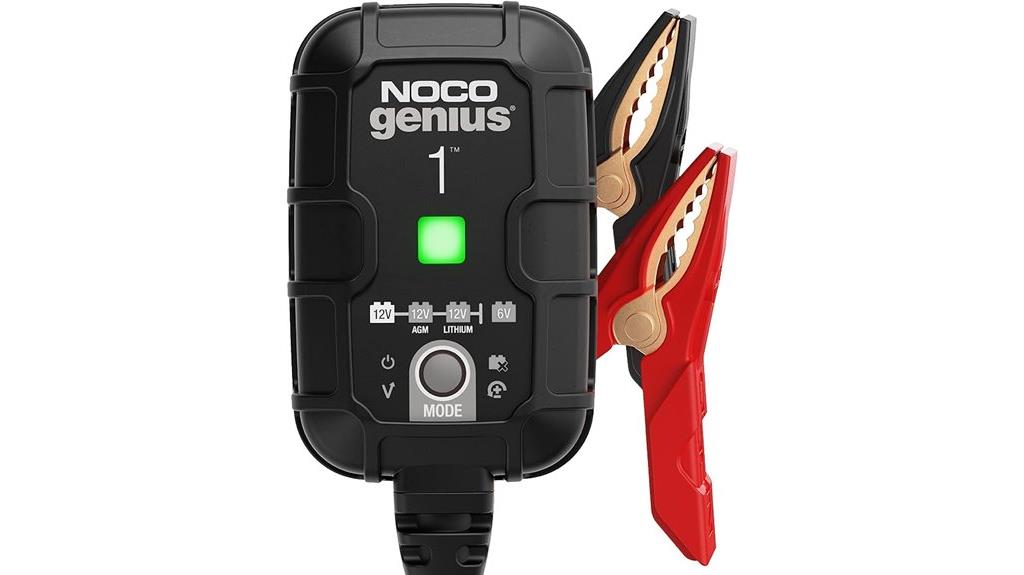
If you’re looking for a versatile and reliable solution to restore and maintain your batteries, the NOCO GENIUS1 Smart Battery Charger stands out as an excellent choice. It functions as a charger, maintainer, trickle charger, and desulfator, delivering 35% more power in a compact, lightweight design. Compatible with 6V and 12V lead-acid and lithium batteries up to 30 amp-hours, it works on a wide range of vehicles and equipment. Its advanced features include temperature-adjusted charging with an integrated thermal sensor, ensuring safe operation in any climate. Easy to connect and use, GENIUS1 is perfect for long-term battery health and preventing drain during storage.
Best For: vehicle and equipment owners seeking a safe, reliable, and versatile solution for maintaining and restoring batteries over the long term.
Pros:
- Supports a wide range of battery types including lead-acid and lithium-ion, compatible with many vehicle makes and models.
- Features advanced safety and charging technologies like temperature-adjusted charging and desulfation for extending battery lifespan.
- Compact, lightweight design with simple connection options makes it easy to use and ideal for unattended maintenance.
Cons:
- Not suitable for jump-starting vehicles or quickly recovering batteries from a dead state.
- Charging from a completely dead battery can take an extended period, up to two weeks.
- Initial setup may be confusing due to limited instructions, requiring some trial and error for optimal use.
12V-48V Battery Desulfator for Lead-Acid Batteries
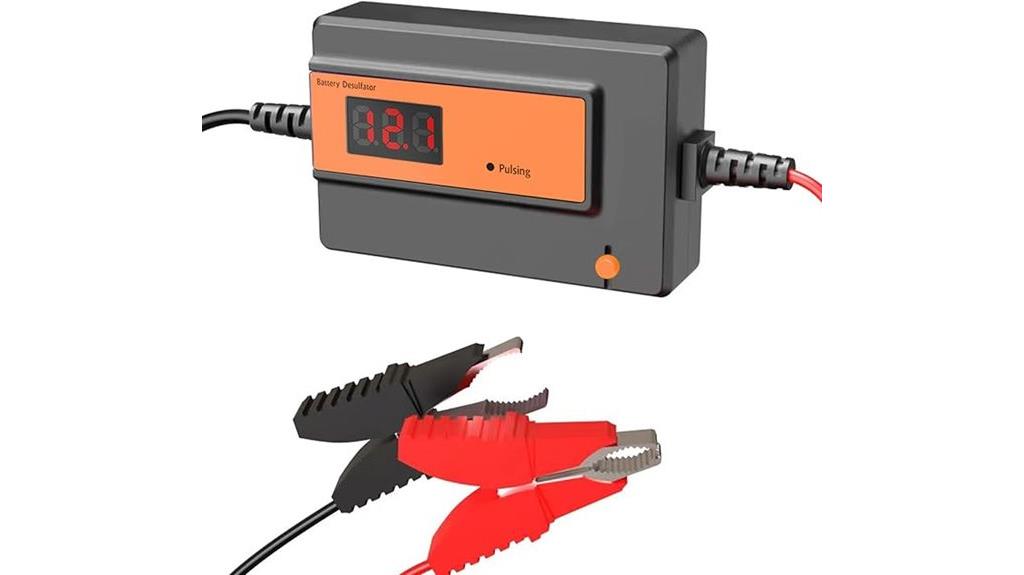
For anyone looking to extend the lifespan of their lead-acid batteries across various vehicle and equipment applications, the V-48V Battery Desulfator offers an effective solution. It supports batteries from 12V to 48V, with large clips for up to 200AH capacity, making it versatile for cars, trucks, boats, and more. Using advanced high-frequency pulse technology, it dissolves sulfates without damaging the plates. Although it takes 1-3 weeks to fully desulfate, it’s ideal for maintenance and restoring battery performance. Keep in mind, it works best on sulfated batteries and isn’t designed for severely damaged or completely dead ones.
Best For: those seeking to restore and maintain lead-acid batteries in various vehicles and equipment over time, especially when sulfation is a concern.
Pros:
- Uses advanced high-frequency pulse technology to safely dissolve sulfates without damaging plates.
- Compatible with a wide range of lead-acid battery types and vehicle applications, supporting 12V to 48V systems.
- Cost-effective solution that can extend battery life and improve performance without needing replacements.
Cons:
- Desulfation process can take 1-3 weeks, requiring patience and multiple cycles for best results.
- Effectiveness depends on the battery’s condition; it cannot repair severely damaged or completely dead batteries.
- Some users report limited visible improvements, especially on heavily sulfated or older batteries, making results variable.
YONHAN Battery Charger 10-Amp 12V/24V Smart Car Battery Charger
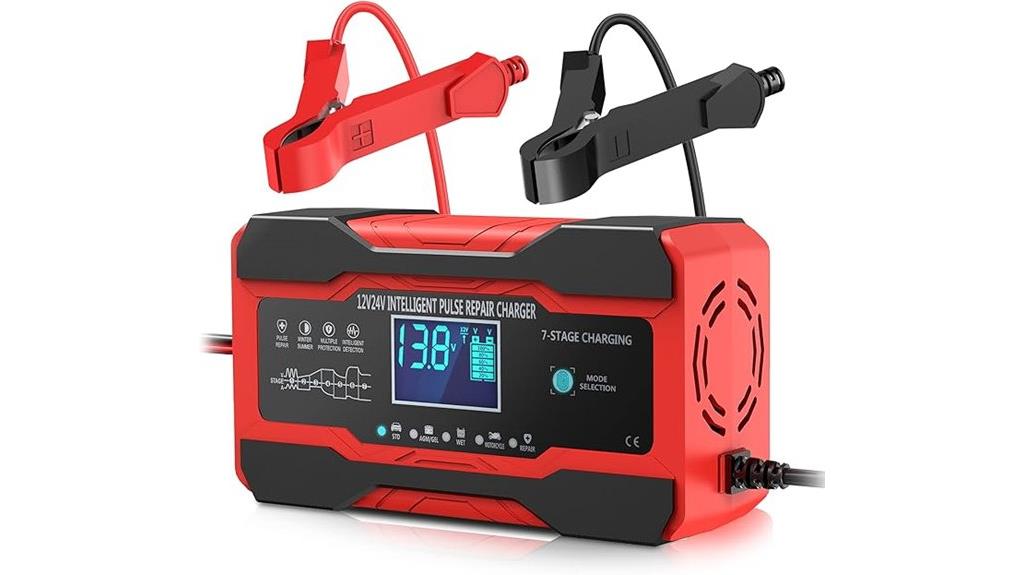
The YONHAN Battery Charger 10-Amp 12V/24V Smart Car Battery Charger stands out as a versatile choice for vehicle owners who need reliable, multi-functional charging and maintenance. It acts as a charger, maintainer, trickle charger, and desulfator, compatible with all lead-acid batteries like AGM, GEL, SLA, and flooded types. Its intelligent features include winter and summer modes, a trickle charge switch, and a backlit LCD displaying crucial info such as voltage and temperature. Designed for safety with reverse polarity, overcharge, and short circuit protections, it’s perfect for reviving old batteries or maintaining long-term storage, ensuring your vehicle’s battery stays healthy and ready to go.
Best For: vehicle owners seeking a versatile, reliable, and safe battery charger and maintainer compatible with various lead-acid batteries for cars, trucks, motorcycles, and boats.
Pros:
- Multi-functional as a charger, maintainer, trickle charger, and desulfator for comprehensive battery care.
- Equipped with intelligent features like temperature-adjusted modes, LCD display, and safety protections (reverse polarity, overcharge, short circuit).
- Suitable for reviving old batteries and maintaining long-term storage, extending battery lifespan.
Cons:
- Cannot charge batteries below 0.3V or damaged batteries, limiting use with severely depleted or damaged units.
- Requires proper connection and clean terminals; incompatible with lithium or severely damaged batteries.
- May not be effective on batteries that are completely dead, damaged, or of non-lead-acid types.
200AH Lead Acid Battery Desulfator (12-48V, 2A)
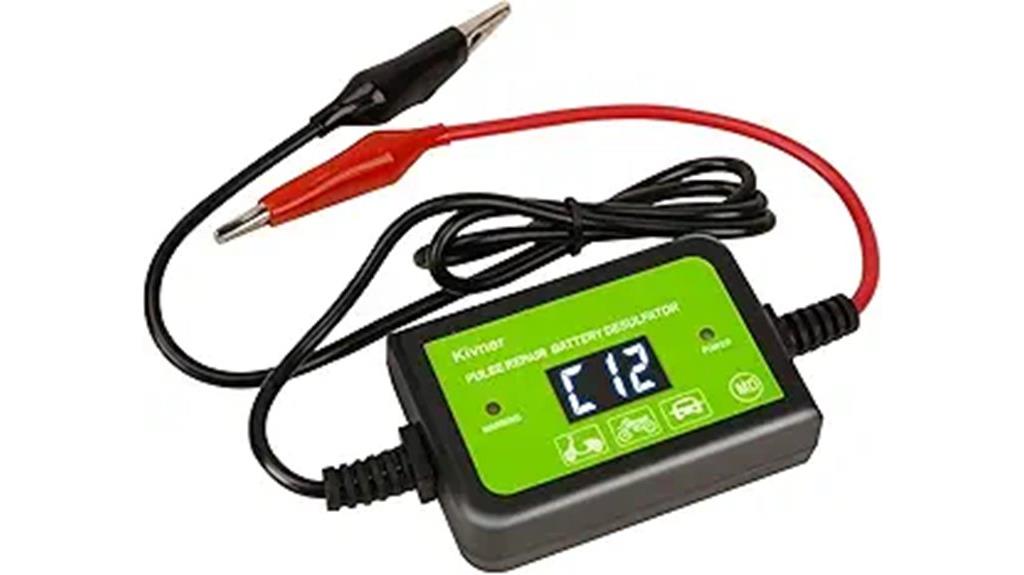
As someone seeking an effective solution to restore the capacity of smaller lead-acid batteries, I find the AH Lead Acid Battery Desulfator (12-48V, 2A) to be an ideal choice. It uses high-frequency pulses to break down lead sulfate crystals that cause sulfation, which diminishes battery performance. Compatible with batteries up to 200AH, including AGM, SLA, and VLRA types, it’s easy to use—auto-recognizing voltage, protecting against reverse polarity, and operating quietly. After a few weeks of use, I noticed longer battery life, faster charging, and improved capacity. It’s perfect for maintenance, storage, or revitalizing older batteries, making it a reliable, affordable desulfation tool.
Best For: those looking to restore and extend the life of smaller lead-acid batteries up to 200AH, such as AGM, SLA, or VLRA types, especially for maintenance or storage purposes.
Pros:
- Effectively reduces sulfation using high-frequency pulses, improving battery capacity and lifespan
- Easy to operate with automatic voltage recognition, reverse protection, and waterproof design
- Suitable for batteries in storage, maintenance, or after repeated use, providing noticeable performance improvements in weeks
Cons:
- Not compatible with lithium batteries or batteries with severe structural damage
- Limited effectiveness on larger car batteries or batteries with significant pole plate damage
- Requires proper polarity connection and periodic use for optimal results, which may be overlooked by some users
NOCO GENIUS10 10A Smart Battery Charger
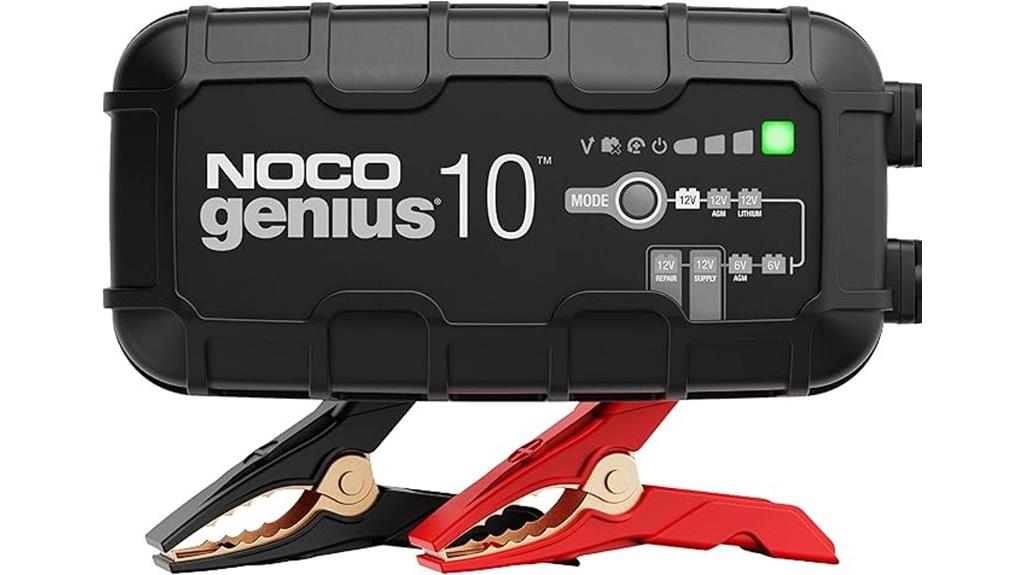
If you’re looking for a versatile and reliable charger that can restore and maintain a wide range of batteries, the NOCO GENIUS10 10A Smart Battery Charger stands out. It’s compact, about 4.5 inches wide, and packs 17% more power than its predecessor, making it ideal for cars, boats, motorcycles, and even lithium-ion batteries. With built-in desulfation and repair modes, it can revive neglected batteries and prevent sulfation. Its smart system automatically adjusts charging based on temperature, ensuring safe, efficient operation. Plus, it’s fully weatherproof and safe to leave connected long-term, helping keep your batteries healthy and ready to go whenever you need them.
Best For: DIY enthusiasts, vehicle owners, and mechanics seeking a versatile, reliable charger capable of restoring and maintaining various lead-acid and lithium-ion batteries safely and efficiently.
Pros:
- Supports a wide range of batteries including AGM, Gel, Flooded, Deep-Cycle, and LiFePO4 with desulfation and repair modes
- Compact design with built-in safety features like reverse polarity protection and spark-proof operation
- Suitable for long-term maintenance and restoring neglected batteries, saving money on replacements
Cons:
- Slow charging rate typical for smart chargers may take longer to fully charge batteries
- Initial setup instructions can be confusing; some users may require online resources for guidance
- Limited to batteries up to 230 amp-hours, which may not suit larger industrial or commercial batteries
Battery Charger 6-Amp 12V Smart Battery Trickle Charger
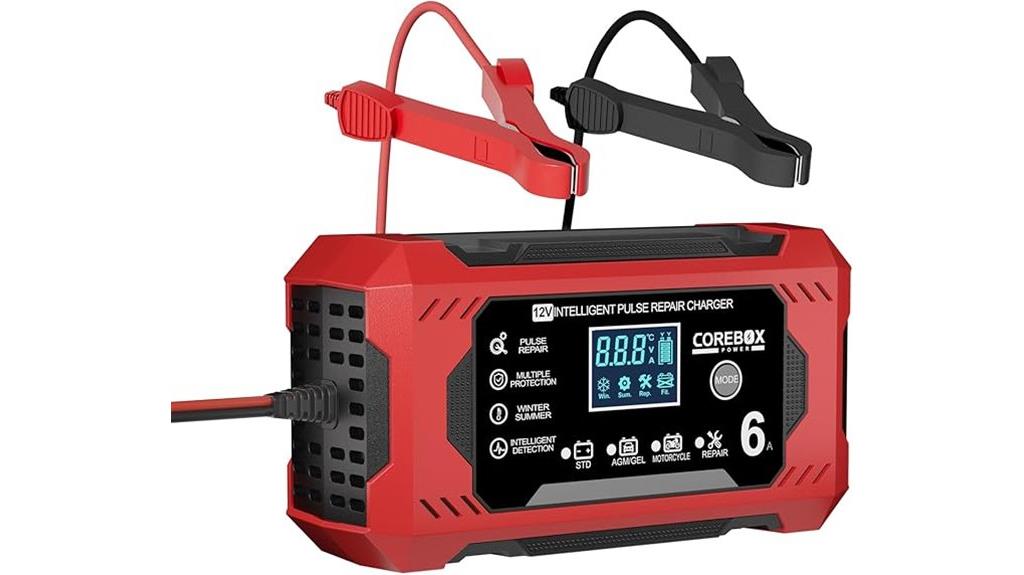
Designed for vehicle owners who want safe, efficient battery maintenance, the Battery Charger 6-Amp 12V Smart Battery Trickle Charger combines multiple functions into one device. It acts as a charger, maintainer, trickle charger, and desulfator, suitable for various 12V lead-acid batteries like AGM, GEL, SLA, and Flooded types. With its 7-stage intelligent charging process—including desulfation and pulse repair—it restores and extends battery life. Equipped with temperature compensation and advanced safety features, it adapts to seasonal changes and prevents damage. Its automatic shutoff guarantees safe operation, making it an ideal tool for maintaining batteries during winter, vacations, or long-term storage.
Best For: Vehicle owners seeking a safe, efficient, and versatile solution for maintaining and restoring 12V lead-acid batteries across various vehicle types and storage conditions.
Pros:
- Combines multiple functions (charger, maintainer, desulfator) in one device for versatile use
- 7-stage intelligent charging with desulfation and pulse repair to extend battery lifespan
- Equipped with safety features like overcurrent, reverse connection, and overvoltage protections for reliable operation
Cons:
- Cannot revive completely dead batteries that are beyond repair
- Requires understanding of proper connection to avoid misuse, despite safety protections
- May be less effective on batteries with severe damage or advanced aging that cannot be restored
Car Jump Starter with Air Compressor and Power Station
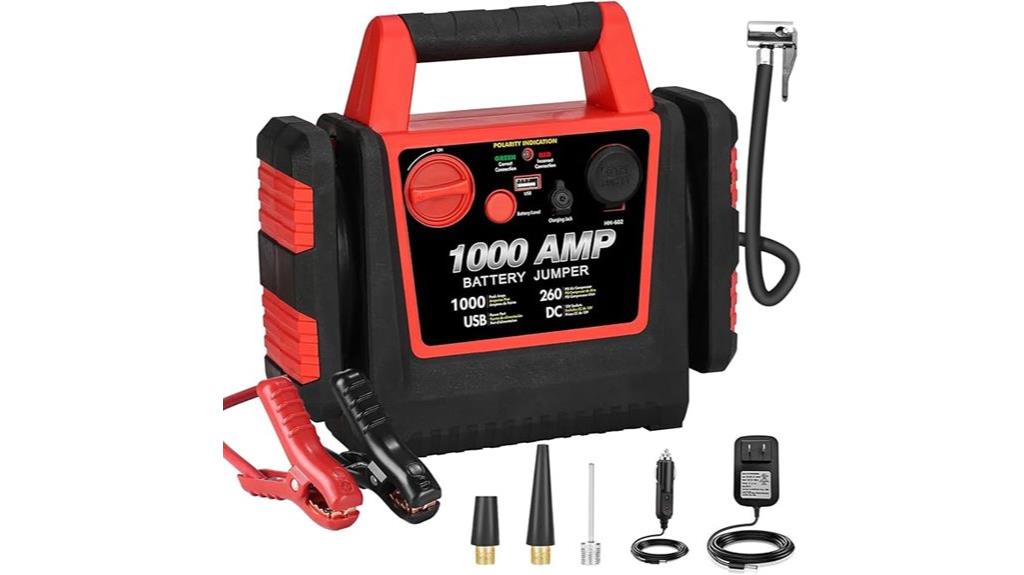
The Car Jump Starter with Air Compressor and Power Station is an ideal choice for anyone who needs a reliable all-in-one device to handle emergencies on the go. With 1000 amps peak current, it quickly starts 12V vehicles, including cars, bikes, and tractors up to 5L engines. It features a built-in 260 PSI air compressor that inflates tires to 30 PSI in minutes, plus safety protections like overcharge and reverse polarity. Its 10,000 mAh power station charges phones and accessories via USB or DC ports. Compact and versatile, it’s perfect for roadside emergencies, outdoor adventures, or everyday use, ensuring you’re prepared anytime, anywhere.
Best For: DIY car owners, outdoor enthusiasts, and travelers seeking a reliable all-in-one device for vehicle starting, tire inflation, and device charging.
Pros:
- Combines jump starter, air compressor, and power bank into one portable device for convenience.
- High peak current of 1000A efficiently starts vehicles up to 5L engines and various motorized equipment.
- Built-in safety protections and temperature resilience ensure safe operation in extreme conditions.
Cons:
- Relatively heavy at over 10 pounds, which may reduce portability for some users.
- Charging via car or AC outlets can take several hours, requiring planning ahead.
- Limited capacity for multiple device charges simultaneously, especially during heavy use.
6A Car Battery Charger for 6V/12V Batteries
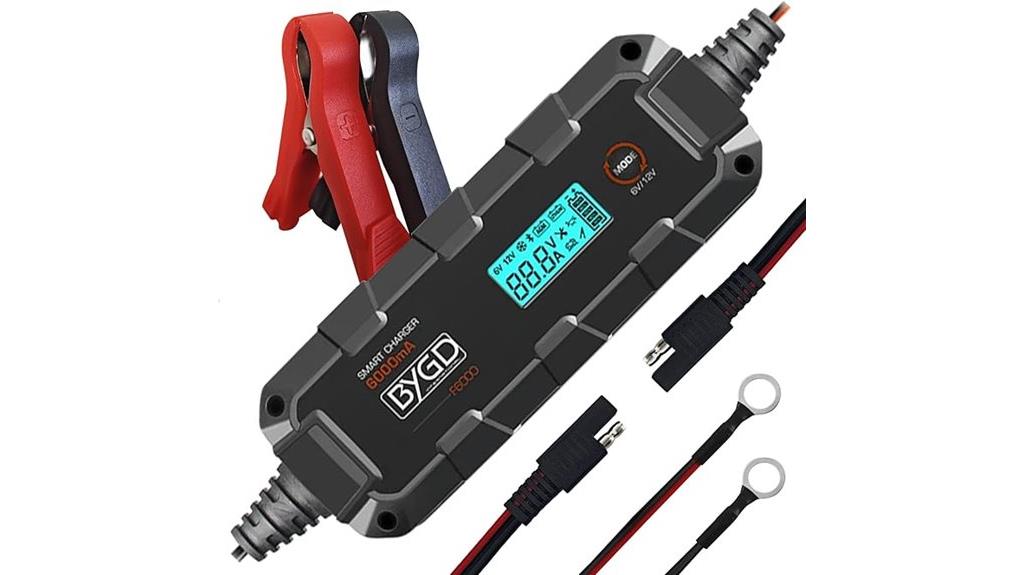
A versatile 6A car battery charger for 6V and 12V lead-acid and LiFePO4 batteries stands out as an ideal choice for vehicle owners who want a reliable, all-in-one solution. This smart charger features an 8-stage process, including desulfation, float charging, and trickle support, ensuring excellent maintenance. It can repair batteries using pulse technology, even when they’re as low as 2V, helping extend their lifespan. Designed with safety in mind, it offers protections against shorts, over-current, and reverse polarity. The LCD display provides real-time info, making operation straightforward. It’s perfect for cars, boats, motorcycles, and more, providing safe and efficient charging.
Best For: vehicle owners seeking a versatile, safe, and efficient charger for 6V and 12V lead-acid and LiFePO4 batteries across various types of vehicles and equipment.
Pros:
- Supports 8-stage charging including desulfation, float, and trickle modes for comprehensive battery maintenance
- Equipped with pulse repair technology to extend battery lifespan and recover low-voltage batteries as low as 2V
- Features a clear LCD display with real-time voltage, current, and temperature readings for easy operation and monitoring
Cons:
- Cannot activate or fully charge batteries that are completely dead or beyond repair
- May require some familiarity with battery types and charging modes for optimal use
- Limited to lead-acid and LiFePO4 batteries; not compatible with other battery chemistries
C20 Adjustable Battery Charger and Battery Maintainer (BLB-C20)
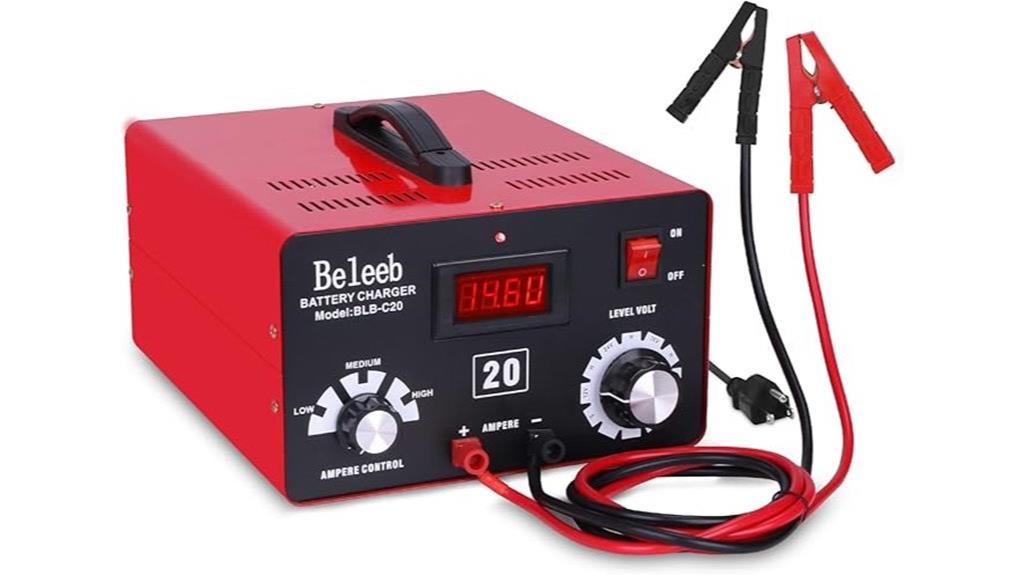
If you need a versatile charger that can handle various battery types and voltages, the C20 Adjustable Battery Charger and Maintainer (BLB-C20) is an excellent choice. It supports 12V, 24V, 36V, and 48V batteries, including lead-acid, LiFePO4, lithium, SLA, AGM, GEL, and deep cycle types. Designed for multiple vehicles like cars, motorcycles, RVs, boats, and more, it offers both normal and high-voltage pulse “H” modes for maintenance and emergency charging. Its intelligent system adjusts voltage and current automatically, ensuring safe, efficient charging and prolonging battery life. Compact and protected with overload circuits, it’s perfect for routine and emergency use.
Best For: DIY enthusiasts, vehicle owners, and maintenance professionals seeking a versatile, multi-voltage charger suitable for various battery types and applications.
Pros:
- Supports multiple battery voltages (12V, 24V, 36V, 48V) and types (lead-acid, LiFePO4, lithium, SLA, AGM, GEL, deep cycle).
- Features dual charging modes, including a high-voltage pulse “H” mode for maintenance and emergency charging.
- Intelligent system automatically adjusts voltage and current for safe, efficient, and battery-friendly charging.
Cons:
- Not recommended for long-term charging of lithium LiFePO4 batteries without BMS.
- May be less suitable for users requiring dedicated, single-voltage chargers.
- Slightly limited maximum current ratings (12A at 12V, 10A at 24V, etc.) for high-capacity batteries.
NOCO GENIUS2 2A Smart Battery Charger
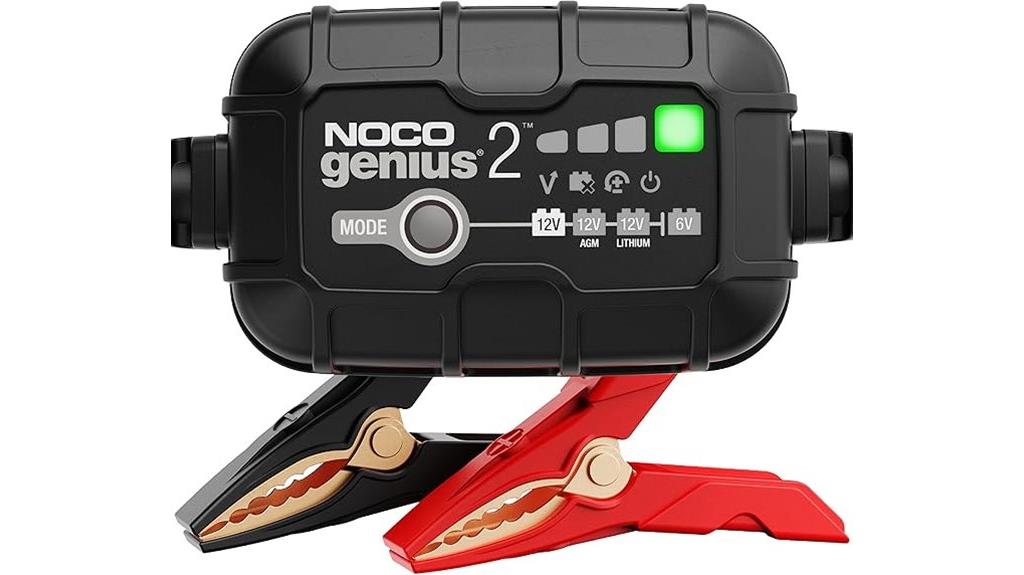
For vehicle owners seeking a reliable, compact charger that can also restore and maintain batteries, the NOCO GENIUS2 2A Smart Battery Charger stands out as an excellent choice. It’s a versatile all-in-one device, delivering 2 amps of power in a small, lightweight design. Compatible with 6V and 12V lead-acid and lithium-ion batteries, it’s perfect for cars, motorcycles, boats, and more. Its automatic, temperature-compensated charging prevents over- and undercharging. It can revive deeply discharged batteries using pulse technology, and its safety features allow indefinite connection for maintenance. Users love its ease of use, but it may struggle with batteries below 1V without jump-starting first.
Best For: vehicle owners seeking a compact, reliable charger capable of restoring and maintaining a variety of small to medium-sized batteries safely and effortlessly.
Pros:
- Compact, lightweight design making it portable and easy to store
- Automatic, temperature-compensated charging ensures safe, optimal battery care
- Capable of reviving deeply discharged batteries with pulse technology
Cons:
- May struggle to revive batteries with voltage near zero without jump-starting first
- Limited to 2A power output, which may be slow for larger or severely drained batteries
- Not suitable for batteries larger than 40Ah or for high-current repair needs
Factors to Consider When Choosing a Battery Desulfator 12V

When selecting a 12V battery desulfator, I consider how well it matches my battery types and its overall effectiveness. I also look at its power ratings and how easy it is to set up and operate. Finally, safety features are important to me to guarantee reliable and secure use.
Compatibility With Batteries
Choosing the right 12V battery desulfator starts with confirming compatibility with your specific battery’s voltage, capacity, and chemistry. I always double-check that the device is suitable for 12V lead-acid batteries up to 200AH, which covers most applications. It’s crucial to confirm that the desulfator supports your battery type—whether AGM, GEL, flooded, or deep-cycle—to prevent damage and ensure effective desulfation. I also verify that the connection clips or terminals fit your battery’s size and design for a secure connection. Additionally, I look for automatic detection features that can recognize my battery’s type and size, optimizing safety and performance. Finally, I make sure the device is rated for my battery’s chemistry to avoid incompatible treatments that could harm the battery or shorten its lifespan.
Technology and Effectiveness
High-frequency pulse technology, typically around 65kHz, is the core mechanism behind most effective 12V battery desulfators. This high-frequency pulsing dissolves lead sulfate crystals that build up on battery plates, restoring capacity without damaging the battery. The effectiveness depends on the level of sulfation; it works best on moderately sulfated batteries and is less effective on severely damaged or dead ones. Desulfation can take from several days to three weeks, requiring continuous or repeated use for ideal results. Proper compatibility with your battery’s type and capacity, usually up to 200AH, is essential for safety and efficiency. Keep in mind, desulfators are most effective as part of a maintenance routine, preventing sulfation buildup rather than instantly repairing heavily deteriorated batteries.
Power and Current Ratings
The power and current ratings of a 12V battery desulfator are crucial factors that directly influence its ability to effectively restore sulfated batteries. The power rating, often measured in watts or amps, indicates how much energy the device can deliver, impacting its efficiency. Higher current ratings, expressed in amperes, allow for faster sulfate crystal dissolution, making the desulfation process quicker. However, these higher ratings require sturdier wiring and safety measures to prevent damage. When choosing a desulfator, it’s important to match its current output to your battery’s capacity, typically measured in amp-hours (Ah). A proper match ensures safe operation and maximum restoration, especially for larger batteries. Selecting the right power and current ratings guarantees effective sulfation removal without risking damage to your battery or system.
Ease of Use and Setup
When selecting a 12V battery desulfator, ease of use and setup are key factors to contemplate. I look for models with clear, easy-to-read indicators or displays so I can monitor the process without guesswork. Automatic detection and adjustment features are a big plus, simplifying setup and reducing errors. Connection options like alligator clips or quick-connect terminals make installation straightforward, requiring minimal tools and expertise. I also check that the device comes with thorough, user-friendly instructions or manuals to guide me through installation and operation. Lastly, I prefer desulfators with minimal configuration steps and automatic safety shutoff, which help prevent mishandling and ensure safe, hassle-free use. These features make maintaining my batteries more manageable and less stressful.
Safety and Protection Features
Choosing a 12V battery desulfator with robust safety and protection features is essential to prevent damage to both the device and the battery. Look for models that include protections like reverse polarity, overcurrent, overvoltage, and short circuit prevention to safeguard your equipment. Automatic shutoff features are also valuable, as they prevent overdischarge and avoid harming the battery during prolonged use. Temperature compensation is another vital aspect, adjusting pulse intensity based on ambient conditions to enhance safety and efficiency. If you plan to use the desulfator outdoors or in damp environments, opt for waterproof or weather-resistant casings to prevent electrical hazards. Additionally, devices with built-in error indicators or alarms help alert you to connection issues or malfunctions, promoting safe handling and effective desulfation.
Maintenance and Longevity
Proper maintenance with a 12V battery desulfator can markedly extend your lead-acid battery’s lifespan by preventing sulfation buildup, which diminishes capacity and speeds up failure. Regular use during inactivity or after deep discharges helps restore performance and boosts longevity. The effectiveness of a desulfator depends on how early you intervene; addressing sulfate accumulation early yields better results. Combining desulfation with routine checks of water levels and terminal cleanliness ensures your battery stays in excellent condition. Consistent application as part of your maintenance routine can delay costly replacements and keep your power supply reliable. By focusing on proper maintenance, you not only protect your investment but also maximize your battery’s overall lifespan and performance.
Price and Warranty Options
Evaluating the price and warranty options of a 12V battery desulfator helps guarantee you select a model that provides good value and reliable performance. Budget models priced between $20 and $50 usually offer basic features and come with a 1-year warranty, making them suitable for light maintenance. If you’re willing to invest more than $50, you typically get extended warranties of 2 years or longer, along with advanced repair capabilities. Higher-priced units often include 3-year or lifetime warranties, which reflect better build quality and customer support. It’s essential to compare warranty coverage details, such as repair or replacement policies, to ensure you’re protected long-term. Choosing a desulfator with a solid warranty can save you money and hassle down the line.
Frequently Asked Questions
How Do Desulfators Extend Battery Lifespan?
Desulfators extend my battery’s lifespan by breaking down lead sulfate crystals that form on the plates. These crystals reduce capacity and efficiency over time. When I use a desulfator, it sends high-frequency pulses that dissolve these deposits, restoring the battery’s ability to hold a charge. This process not only revives my battery but also helps prevent early failure, saving me money and hassle in the long run.
Can Desulfators Repair Completely Dead Batteries?
You might be surprised, but desulfators usually can’t revive completely dead batteries. I’ve seen them work wonders on slightly sulfated ones, restoring some life and extending their use. However, if your battery is fully dead—no charge or response—desulfators won’t bring it back. They’re best for maintenance and minor issues, not for batteries that have lost all capacity. So, for a truly dead battery, replacement is often the only option.
Are Desulfators Compatible With All Lead-Acid Batteries?
Yes, desulfators are generally compatible with most lead-acid batteries, including flooded, AGM, and gel types. I’ve found that they work well to extend battery life and improve performance across different models. However, I recommend checking your battery’s specifications or consulting the manufacturer before use. This way, you guarantee compatibility and avoid any potential damage, giving your battery the best chance to regain its power.
How Often Should a Desulfator Be Used on a Battery?
Think of your battery as a garden needing regular care. I recommend using a desulfator every few months or whenever your battery shows signs of weakness, like slow starts or reduced runtime. Regular use helps prevent sulfate buildup and keeps your battery healthy. Don’t wait until it’s completely dead—think of it as tending to your garden regularly, nurturing its life and ensuring it blooms with full power when you need it most.
What Are the Signs My Battery Needs Desulfation?
If your battery is struggling to hold a charge, has reduced performance, or takes longer to start your vehicle, it’s likely time for desulfation. You might also notice corrosion around the terminals or a swollen case. I recommend checking the voltage regularly; a significant drop can indicate sulfation buildup. When you see these signs, using a desulfator can help restore your battery’s power and extend its lifespan.
Conclusion
So, there you have it—your trusty squad of battery saviors ready to banish sulfation and bring your dead batteries back to life. Think of these desulfators as tiny miracle workers, armed with enough juice to resurrect even the most stubborn power-hungry undead. Don’t let your battery become a fossil in the garage; give these gadgets a shot and watch your power come roaring back like a phoenix from the ashes—minus the dramatic flames, of course.

